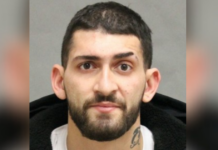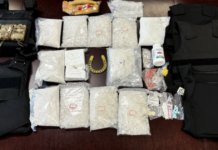The United Conservative Party government’s first major effort to allow addicts to be “unencumbered in their pursuit of a better life for themselves” will open later this month.
The Red Deer Recovery Community, the only one of its kind in Alberta, is the first of six massive recovery communities currently being built by the province.
Marshall Smith, chief of staff to Alberta’s premier and recovered addict of 17 years, has been guiding the UCP government’s approach to homelessness and addiction.
He said the facilities recreate community in a healthy way, unlike other approaches which isolate homeless addicts in hotel rooms.
“It’s about getting people who are in a fight against addiction together as a community and allowing them to heal together and support each other in doing that,” he told True North in an earlier interview.
Smith said previous governments of all political spectrums haven’t had the political will to appropriately plan, fund and build a proper system of care.
But that’s about to change in Alberta as the province trades “decades of neglect” for what Smith calls a “breathtaking system of care.”
The new facility in north Red Deer is nearly the size of a football field. It has 75 beds and the ability to treat up to 300 people per year. It was announced on July 18, 2020 and construction began in November 2021.
There are also recovery communities underway in Lethbridge, Gunn, Calgary, Edmonton and on the Blood Tribe. Smith told True North the province hopes to build 11 in total. Details on other facilities are not yet public.
The facilities cost around $20 million each. Programs vary from one month to one year, depending on the client’s needs.
In the new Red Deer facility, clients will spend their time in therapy and doing jobs around the facility, like working in the kitchen, gardening, or doing administrative work based on their preferences.
Smith said the addiction spreading from Vancouver down the western seaboard of the United States and across Canada is “causing incredible damage to our culture, to our communities, to the fabric of our social contract to the disorder and safety in our cities.”
At the same time, he said decriminalization has resulted in “incredible pressure” on healthcare systems. Prisons were once the service of last resort, but now that’s a hospital emergency room – which are “flooded” with homeless addicts and those with mental health issues who are no longer being serviced in correctional centres or voluntary treatment facilities, he said.
“That’s causing an unbelievable spike in ambulance calls, hospital admissions, wait times, etc,” he said.
“And that’s happening across the country and it’s happening because successive governments have failed to prepare or plan to make investments into treatment opportunities for people with addiction.”
Beginning Tuesday, adults in B.C. with up to two-and-a-half grams of drugs for personal use, including opioids, cocaine and MDMA, will not be arrested or charged.
Smith said it’s a “simple, but not easy process” to address the homelessness and addictions crisis. It takes political will and investment, and the understanding that addiction is a treatable illness which demands available treatment. Without available spaces, people forced to wait for treatment wind up in tents on the street.
“It’s really not a tough concept to understand.”
Smith said a recovery-oriented system of care means keeping the system flowing. Enough treatment beds means freeing up space in detox, resulting in dropping the count in shelters and less people living on the streets.
He also says Alberta’s efforts over the last four years have put them far ahead of other provinces.
“There’s still lots of work to do,” he said. “This isn’t a problem that’s going to be fixed overnight.”





















